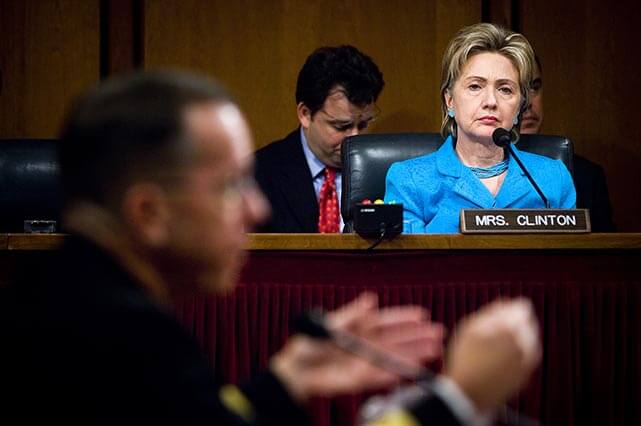Clinton challenges Obama on fracking
Hilary Clinton subtly positioned herself against Obama’s “all of the above” energy strategy in a speech to a League of Conservation Voters in New York City yesterday. While she avoided talking about the Keystone XL pipeline, Arctic drilling, coal, and even using the word “fracking,” she did acknowledge the risks associated with the rapid expansion of natural gas. “Methane leaks in the production and transportation of natural gas pose a particularly troubling threat so it is crucial we put in place smart regulations and enforce them – including deciding not to drill when the risks…are just too high,” she said. There is speculation that Clinton may be trying to appeal to voters who oppose fracking as she prepares to run in the next presidential election.
Clean energy jobs outpace the oil sands
Clean Energy Canada released a report today on the state of renewable energy in Canada. Thanks to about $25 billion in investments, Canada’s clean-energy jobs have increased 37 per cent between 2009 and 2013. That means direct Canadian jobs in the clean-energy sector outnumber those in the oil sands. The report counters this good news by saying that the Canadian government is still “indifferent” to renewable energy, unlike in the United States where clean energy is a national priority. “To really get in the game, the government needs to start to level the playing field for clean energy through effective tax support,” said Merran Smith, the director of Clean Energy Canada. The report also calls for greater investment in infrastructure and putting a price on carbon pollution.
Republican lives a life powered by sunshine
George Shultz, Ronald Reagan’s Secretary of State and a former University of Chicago economics professor, drives an electric car, has solar panels on the roof of his home and advocates for government action on climate change. He is also encouraging his fellow Republicans to “take out an insurance policy” on climate change because “the potential results are catastrophic.” Although Republicans in the Senate and House stand firmly opposed to Obama’s initiative to reduce greenhouse gas emissions by 2025, Shultz said he believes they will eventually be swayed by reality. Shultz is calling for a revenue neutral tax on fossil fuels that would return the money to U.S. citizens in the form of a carbon dividend check. He points to potential national security threats, as well as new political, health and social consequences if the U.S. does not act on climate change.
Norwegian wealth fund invests in clean energy
The world’s largest sovereign wealth fund has announced that it will invest almost $3 billion in clean energy stocks next year. Starting January 1, Norway’s Government Pension Fund Global, will accelerate its investments in renewable energy, waste management, energy storage companies and others. The $870 billion (U.S.) fund is under political pressure to decrease its exposure to the coal industry and ramp up investment in environmentally friendly areas, said chief executive officer Yngve Slyngstad. The European Renewable Energy Index, which includes the 10 largest and most traded clean energy stocks delivered a 35 per cent loss over the last five years. But Slyngstad said he was confident in the long-term potential for clean technology to outperform other investments. “No matter what you think, if it’s going to be a good investment of not, it’s very simple: We will invest in this area,” he said.
Corporate Knights’ managing editor Jeremy Runnalls talked to the architect of the fund, Martin Skancke, about its unique structure. The fund has far more money in it, compared to Alberta’s Heritage Savings Trust Fund, which was set up decades earlier with the same purpose.
The highs and lows of climate negotiations
Between the People’s Climate March in New York City in September, a historic emissions deal between the U.S. and China in November and several countries pledging to contribute almost $10 billion (U.S) to the United Nations Green Climate Fund, the mood was understandably high going into the climate negotiations in Peru this week. A new proposal coming out of the negotiations could potentially dissolve the long-standing division between developed and developing countries. Brazil has proposed a third category for emerging markets that would allow them to choose which category they belong to “and to graduate from one to another as they grow richer,” the Guardian reported today.
Despite signs of a thaw in differences, the European Union and the United States continue to differ on the prospect of a legally binding emissions agreement. The E.U. is arguing for a universal legally binding agreement that would be adopted by 2015 and put into force by 2020. The E.U.’s toughened stance could potentially stall negotiations in the lead-up to the next climate meeting in Paris, the Guardian reported today. The U.S. favours a “buffet option” that allows countries to determine the scale and pace of their emissions reductions.






